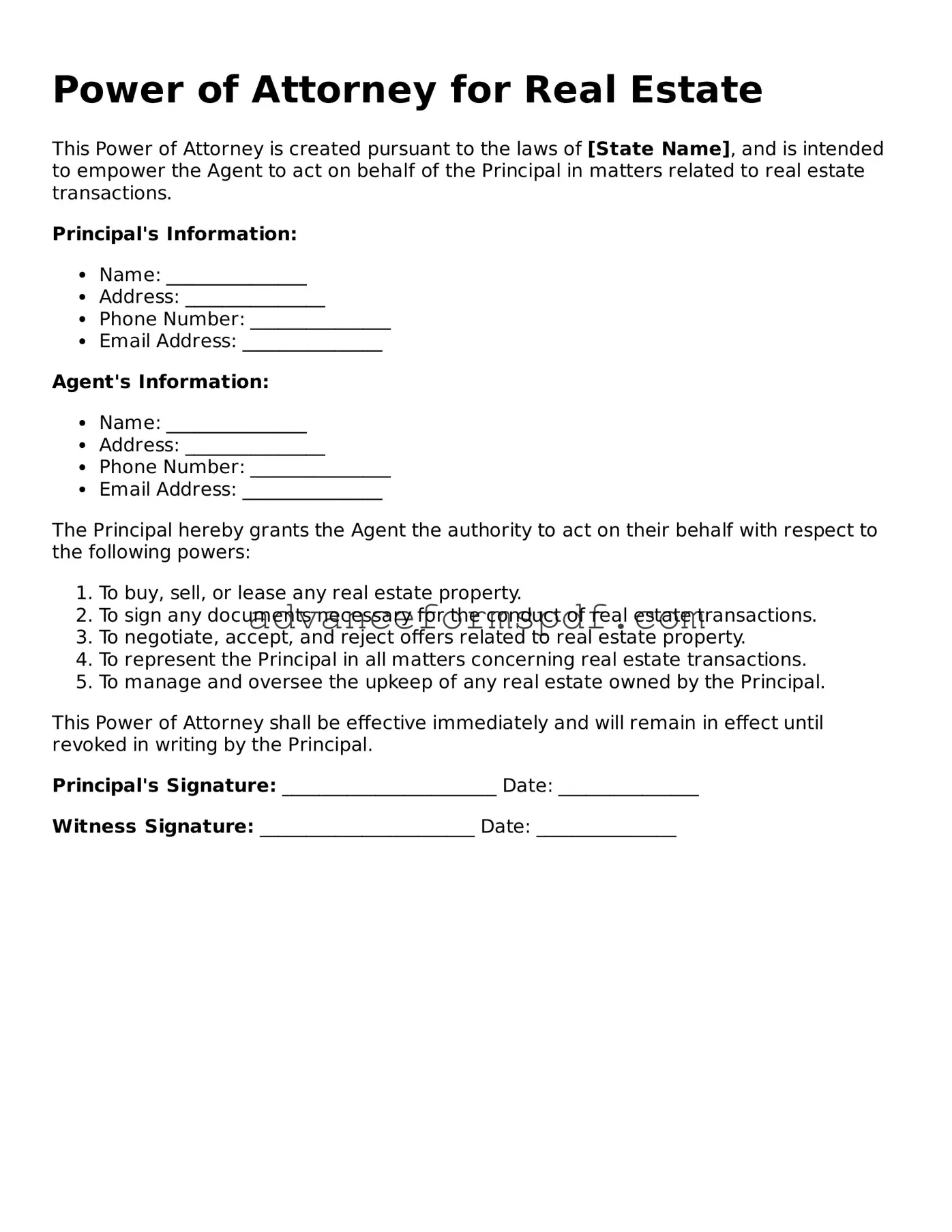Free Real Estate Power of Attorney Document
When navigating the complexities of real estate transactions, having the right tools at your disposal is crucial. One such tool is the Real Estate Power of Attorney form, a legal document that empowers an individual to act on behalf of another in matters related to real estate. This form can be particularly useful in situations where the property owner is unable to be present, whether due to health issues, travel, or other commitments. The appointed agent gains the authority to make decisions regarding the sale, purchase, or management of the property, ensuring that the owner's interests are represented. Key elements of this form include the specification of powers granted, the identification of the parties involved, and the duration of the authority. It is essential to understand the implications of granting such powers, as the agent's decisions can significantly impact the owner's financial and legal standing. Additionally, the form must be executed in accordance with state laws to ensure its validity, making it imperative to pay attention to detail. With the right knowledge and preparation, utilizing a Real Estate Power of Attorney can facilitate smoother transactions and provide peace of mind during the often stressful process of dealing with real estate matters.
PDF Specifics
| Fact Name | Description |
|---|---|
| Definition | A Real Estate Power of Attorney form allows one person to authorize another to act on their behalf in real estate transactions. |
| Legal Authority | This form is governed by state law, which varies by state. For example, in California, it falls under the California Probate Code. |
| Types of Powers | The powers granted can be broad or limited, depending on the needs of the principal. They may include buying, selling, or managing property. |
| Principal and Agent | The person granting the authority is called the principal, while the person receiving the authority is the agent or attorney-in-fact. |
| Revocation | The principal can revoke the Power of Attorney at any time, as long as they are mentally competent. |
| Signature Requirements | Most states require the principal's signature to be notarized for the document to be valid. |
| Durability | A Durable Power of Attorney remains effective even if the principal becomes incapacitated, unlike a standard Power of Attorney. |
| State-Specific Forms | Many states provide specific forms for Real Estate Power of Attorney, which may include additional requirements or language. |
How to Write Real Estate Power of Attorney
Completing the Real Estate Power of Attorney form is an important step in delegating authority for real estate transactions. After filling out the form, it will need to be signed and possibly notarized, depending on your state’s requirements. Here are the steps to help you fill out the form accurately.
- Begin by entering the date at the top of the form.
- Provide your full name and address in the designated sections. This identifies you as the principal.
- Next, enter the name and address of the person you are appointing as your agent. This person will act on your behalf.
- Clearly specify the powers you are granting to your agent. This may include buying, selling, or managing real estate.
- If applicable, indicate any limitations on the powers you are granting. Be specific about what your agent can and cannot do.
- Review the form for accuracy. Make sure all names and addresses are correct.
- Sign the form in the designated area. Your signature confirms your intent.
- Depending on your state, you may need to have the form notarized. Check local requirements to ensure compliance.
Real Estate Power of Attorney Example
Power of Attorney for Real Estate
This Power of Attorney is created pursuant to the laws of [State Name], and is intended to empower the Agent to act on behalf of the Principal in matters related to real estate transactions.
Principal's Information:
- Name: _______________
- Address: _______________
- Phone Number: _______________
- Email Address: _______________
Agent's Information:
- Name: _______________
- Address: _______________
- Phone Number: _______________
- Email Address: _______________
The Principal hereby grants the Agent the authority to act on their behalf with respect to the following powers:
- To buy, sell, or lease any real estate property.
- To sign any documents necessary for the conduct of real estate transactions.
- To negotiate, accept, and reject offers related to real estate property.
- To represent the Principal in all matters concerning real estate transactions.
- To manage and oversee the upkeep of any real estate owned by the Principal.
This Power of Attorney shall be effective immediately and will remain in effect until revoked in writing by the Principal.
Principal's Signature: _______________________ Date: _______________
Witness Signature: _______________________ Date: _______________
Discover Common Types of Real Estate Power of Attorney Forms
Poa Revocation Form - Take control of your life—this form is a vital step in doing just that.
Ensuring that your affairs are managed correctly is vital, and having a reliable representative in place can ease the burden during difficult times. For more information on how to create this essential document, visit https://txtemplate.com/power-of-attorney-pdf-template to access a Texas Power of Attorney form that suits your needs.
Power of Attorney for Minor Child Florida - Provides clear guidelines on who can act for your child in specific situations.
Dmv Power of Attorney - This Power of Attorney makes handling vehicle tasks easier for both you and your agent.
